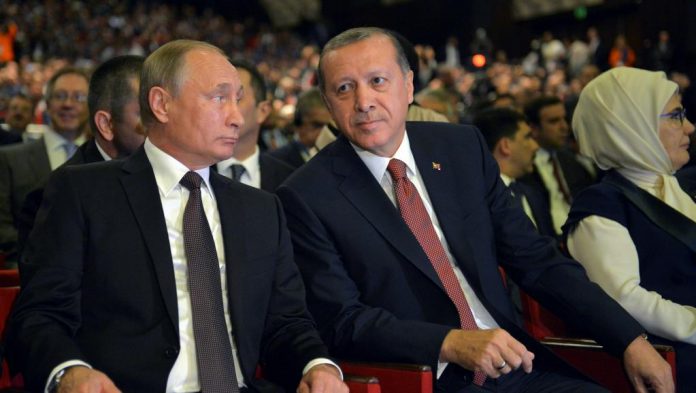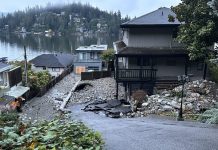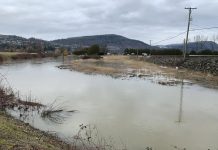Turkey and Russia have signed a deal to build a major gas pipeline under the Black Sea. A gradual rapproachment since a falling out last year shows the two can pursue a pragmatic relationship.
Turkish President Tayyip Erdogan hosted Russia’s Vladimir Putin at an Ottoman-era villa in Istanbul for talks which touched on energy deals, trade and tourism ties, defence and the conflict in Syria, where the two leaders back opposing sides.
“Today has been a full day with President Putin of discussing Russia-Turkish relations … I have full confidence that the normalisation of Turkish-Russian ties will continue at a fast pace,” Erdogan told a joint news conference. “Our relations will [improve] in many fields, be it in defence industry, political, economic, trade, tourism or culture. We will make up for lost time in the coming days.”
The warming relations between NATO member Turkey and Russia comes as both countries are dealing with troubled economies and strained ties with the West.
Putin said Moscow had decided to lift a ban on some food products from Turkey, imposed after Turkey shot down a Russian fighter jet near the Syrian border last November, and that both leaders had agreed to work towards the full-scale normalisation of bilateral ties.
They signed a deal on the TurkStream undersea gas pipeline, which will allow Moscow to strengthen its position in the European gas market and cut energy supplies via Ukraine, the main route for Russian energy into Europe.
Turkish plan replaces EU South Stream project
The plan for TurkStream emerged after Russia dropped plans to build the South Stream pipeline to Bulgaria due to opposition from the European Union, which is trying to reduce its dependence on Russian gas. South Stream was scrapped after years of planning, with Putin furiously blaming Brussels for its failure.
The pipeline agreement was signed by Russian Energy Minister Alexander Novak and Turkish counterpart Berat Albayrak, in the presence of Putin and Erdogan after their talks, an AFP correspondent reported.
The TurkStream project had languished amid uncertainty after the crisis triggered by the shooting down of a Russian war plane by Turkish forces over the Syrian border in November 2015.
The chief executive of Russian gas giant Gazprom, Alexei Miller, had said ahead of the signing that the agreement foresees the construction of two lines of pipe on the bed of the Black Sea.
The annual capacity of each line is to be 15.75 billion cubic metres of gas (bcma) making a total capacity of over 30 bcma. The agreement aims to build the lines by 2019, Miller added.
Erdogan also said plans for a Russian-built nuclear power plant in Turkey would be accelerated. Time lost on the Akkuyu project because of strained relations would be made up, he said.
In 2013, Russia’s state nuclear corporation Rosatom won a $20 billion contract to build four reactors in what was to become Turkey’s first nuclear plant, but construction was halted after the downing of the Russian jet.
Deep divisions on Syria
Putin received Erdogan in a Tsarist-era palace outside his home city of St Petersburg in August, when the two leaders, both powerful figures ill-disposed to dissent, announced plans for an acceleration in trade and energy ties.
But progress on Syria, over which they remain deeply divided, has been more problematic. Erdogan described the topic as “very sensitive”, but said he had discussed Turkey’s military operations in Syria with Putin on Monday.
Both men said they had agreed on the importance of delivering aid to the city of Aleppo, whose opposition-held eastern sector has been encircled by Russian-backed Syrian forces for all but a short period since July.
“We have a common position that everything must be done to deliver humanitarian aid to Aleppo. The only issue is … ensuring the safety of aid delivery,” Putin said, adding he had agreed with Erdogan to intensify military contacts.
Russia has backed Syrian President Bashar al-Assad with a year-long air campaign against the rebels fighting him. Turkey backs the rebels and wants to see Assad out of power.
On Saturday, Russia vetoed a French-drafted UN Security Council resolution that would have demanded an end to air strikes and military flights over Aleppo. A rival Russian draft text failed to get a minimum nine votes in favour.
Erdogan said there would be further talks with Russia over the conflict in Syria. But there was little sign of any concrete progress towards reconciling their differences.
“We discussed … how we can cooperate on this matter, especially on humanitarian aid to Aleppo, what strategy can we implement so people in Aleppo can find peace,” Erdogan said.
“We will come together with our foreign ministries and top military leaders and intelligence officers.”















